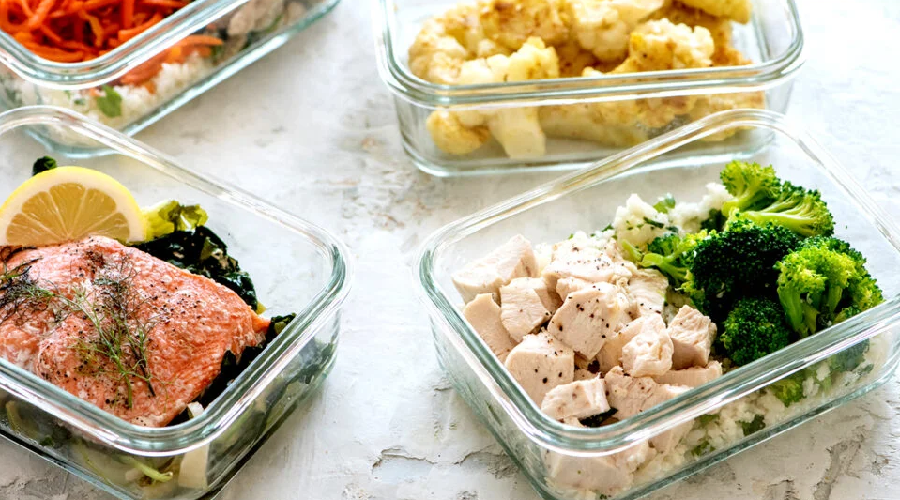Losing weight is not just about cutting calories—it’s about nourishing your body with the right foods that support metabolism, improve digestion, and keep you feeling full and satisfied. A well-balanced diet rich in nutrient-dense foods can enhance your weight loss journey while boosting your energy levels and overall well-being. If you’re looking to shed pounds in a healthy and sustainable way, here are some top foods to include in your daily meals.
1. Leafy Greens – Low-Calorie Nutritional Powerhouses
Leafy greens such as spinach, kale, lettuce, and Swiss chard are packed with vitamins, minerals, and fiber while being incredibly low in calories. Their high water and fiber content help fill you up without adding unnecessary calories, making them a perfect addition to your weight loss diet.
How to Eat: Add leafy greens to salads, smoothies, wraps, or stir-fries for a nutritious boost.
2. Lean Proteins – Essential for Muscle and Fat Burning
Protein is a key component of weight loss because it helps build muscle and boosts metabolism. Foods like chicken breast, turkey, eggs, fish, tofu, and legumes keep you full for longer and prevent overeating. Protein also has a high thermic effect, meaning your body burns more calories digesting it compared to fats and carbohydrates.
How to Eat: Incorporate lean protein into every meal—grilled chicken with veggies, scrambled eggs for breakfast, or a protein-packed smoothie.
3. Whole Grains – Fuel for Energy and Satiety
Unlike refined grains, whole grains like quinoa, brown rice, oats, and whole wheat bread contain fiber, which slows digestion and keeps you fuller for longer. They also help regulate blood sugar levels, preventing energy crashes and cravings.
How to Eat: Enjoy oatmeal for breakfast, swap white rice for quinoa, or choose whole grain pasta over regular pasta.
4. Healthy Fats – The Key to Satiety and Fat Loss
Not all fats contribute to weight gain. Healthy fats from avocados, nuts, seeds, and olive oil help keep you full and support metabolism. They also promote brain function and reduce inflammation in the body.
How to Eat: Add avocado to salads, snack on almonds or walnuts, or drizzle olive oil over roasted veggies.
5. Fiber-Rich Fruits – Nature’s Sweet Treat
Fruits such as berries, apples, oranges, and pears are packed with fiber, vitamins, and antioxidants, making them a great alternative to processed sugary snacks. Fiber slows digestion and prevents sugar spikes, helping with appetite control.
How to Eat: Blend berries into smoothies, enjoy an apple with nut butter, or add slices of citrus fruits to your water.
6. Nuts and Seeds – Small but Mighty Snacks
Almonds, walnuts, flaxseeds, and chia seeds are loaded with protein, fiber, and healthy fats. These nutrient-dense snacks can curb hunger and provide sustained energy throughout the day.
How to Eat: Sprinkle chia seeds on yogurt, snack on a handful of nuts, or mix flaxseeds into oatmeal.
7. Legumes – A Protein and Fiber Combo
Beans, lentils, chickpeas, and peas are great plant-based sources of protein and fiber. They help stabilize blood sugar, reduce hunger, and support gut health, all of which contribute to healthy weight management.
How to Eat: Make lentil soup, add chickpeas to salads, or enjoy hummus with veggie sticks.
8. Greek Yogurt – A Gut-Friendly Protein Source
Greek yogurt is rich in protein, probiotics, and calcium, which aid digestion and help maintain a healthy gut. A healthy digestive system plays a crucial role in metabolism and weight regulation.
How to Eat: Enjoy Greek yogurt with honey and berries, blend it into smoothies, or use it as a creamy topping for dishes.
9. Green Tea – A Natural Fat Burner
Green tea contains antioxidants called catechins, which help boost metabolism and fat burning. The small amount of caffeine in green tea also enhances energy levels and focus, making it a great alternative to sugary drinks.
How to Drink: Sip on green tea throughout the day or before a workout to maximize fat-burning benefits.
10. Water – The Ultimate Weight Loss Aid
Proper hydration is essential for weight loss. Drinking enough water helps control hunger, flush out toxins, and improve digestion. Sometimes, thirst is mistaken for hunger, leading to unnecessary snacking.
How to Drink: Drink at least 8 glasses of water a day, and have a glass before meals to prevent overeating.
Final Thoughts
Transforming your weight loss journey starts with making the right food choices. By incorporating nutrient-dense foods into your diet, you can boost metabolism, control cravings, and achieve sustainable weight loss without feeling deprived. Remember, small, consistent changes in your eating habits can lead to lasting results.


